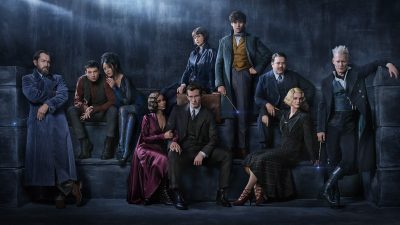
The cast of Fantastic Beasts: The Crimes of Grindelwald – (L-R) Albus Dumbledore (Jude Law), Credence (Ezra Miller), Maledictus (Claudia Kim), Leta Lestrange (Zoe Kravitz), Theseus Scamander (Callum Turner), Tina Goldstein (Katherine Waterston), Newt Scamander (Eddie Redmayne), Jacob Kowalski (Dan Fogler), Queenie Goldstein (Alison Sudol), Gellert Grindelwald (Johnny Depp) – Photo by Mark Seliger/Courtesy of Warner Bros. Pictures.
The second chapter in the Fantastic Beasts Quintology is fun – mostly because of the beasts and the relationships. It could have done without so much Grindelwald (one of Johnny Depp’s least distinguished efforts).
The film opens with a beautifully dark staging of Grindelwald’s escape from the authorities while being transported to England to face punishment for his crimes.
The sequence is showy and energetic and should set the tone for the movie, pace-wise.
It does not.
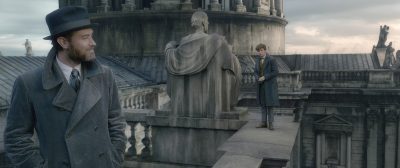
Fantastic Beasts: The Crimes of Grindelwald – Albus Dumbledore (Jude Law), Newt Scamander (Eddie Redmayne) – Photo courtesy of Warner Bros. Pictures.
Instead, it is one of only a few action sequences that takes flight.
As second chapters go, this is no Empire Strikes Back.
Aside from some early moments with Jacob (Dan Fogler) and Queenie (Alison Sudol) there’s also very little humor that doesn’t come from Newt Scamander’s (Eddie Redmayne) supernatural menagerie (especially the Niffler and Pickett).
There’s more character development in this one – the reason for Jacob’s presence is sweet and perfectly logical within the rules of the wizarding world – it’s nice to see that he and Queenie still make a fun couple.
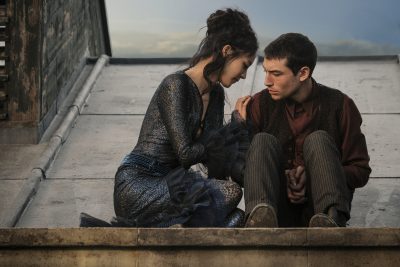
Fantastic Beasts: The Crimes of Grindelwald – Maledictus (Claudia Kim), Credence (Ezra Miller) – Photo by Jaap Buitendijk/Courtesy of Warner Bros. Pictures.
Though Grindelwald’s machinations partially revolve around Credence (Ezra Miller) – who survived the first film – he doesn’t really have much to do here (though he does have a very splashy moment at the film’s end.
We also meet Newt’s brother, Theseus (Callum Turner), who is as outgoing and confident as Newt is not (Newt describes him as ‘and Auror and a hugger – we can’t tell which Newt thinks is worse).
Also new to the series is immortal alchemist Nicolas Flamel (Brodis Jodorowsky) – but he’s mostly there for a quick gag and one splashy magic sequence. His screen time is so slight, the character didn’t have to be referencing a real historical figure.
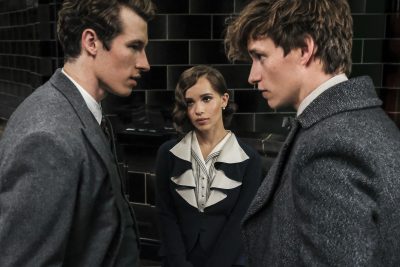
Fantastic Beasts: The Crimes of Grindelwald – Theseus Scamander (Callum Turner), Leta Lestrange (Zoe Kravitz), Newt Scamander (Eddie Redmayne) – Photo by Jaap Buitendijk/Courtesy of Warner Bros. Pictures.
Basically, The Crimes of Grindelwald is about choosing sides – and the way that can galvanize action in ways that cut across relationships and organizations.
Of course, there are revelations that astound – we learn that Dumbledore (Jude Law – excellent in the role) literally cannot fight Grindelwald, and why.
We also learn Grindelwald’s goal (and the way he lies and seduces wizards to follow him) – and if his goals and methods resemble Adolf Hitler’s, that is not coincidental (though it is handled a bit ham-fistedly).
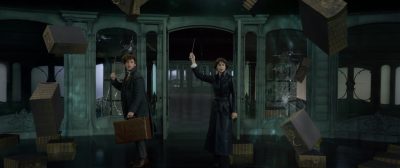
Fantastic Beasts: The Crimes of Grindelwald – Newt Scamander (Eddie Redmayne), Tina Goldstein (Katherine Waterston) – Photo courtesy of Warner Bros. Pictures.
There’s also a rift between Newt and Tina (Katherine Waterston) due to an unfortunate (and very public) circumstance.
Director David Yates, a longtime Rowling interpreter, manages to not get bogged down too much during the expositional scenes (one of which, an oration by Grindelwald kind of grinds the movie to a halt – before exploding in a contrast that is certainly way over the top).
A new creature, a Zouwu (think the living version of those dragons that dance through Chinese New Year parades), gets two of the most impressive action sequences – and the creature itself is the source of some memorable ‘Awwww’ sequences.
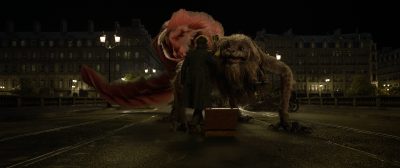
Fantastic Beasts: The Crimes of Grindelwald – A Zouwu – Photo courtesy of Warner Bros. Pictures.
The film’s biggest flaws are that the story is pretty thin for a two-plus hour film, and that Depp’s Grindelwald has only one note – menace – that is either heightened or lessened, but never varied from.
As second chapters go, Fantastic Beasts: The Crimes of Grindelwald is a pretty good argument against setting out to do a five-film story until some judicious editing is done on the scripts.
It’s entertaining, but only just.
Final Grade: C+